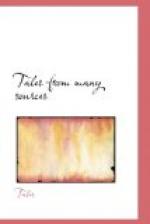“Why do they look at me so strangely, father?” she asked. “Old Squire Thornton, when he welcomed my return to the hunt, held my hand a whole minute in his, and it was as if he were about to speak, for he swallowed once or twice and then turned away. And Doctor Glebe would not speak to me at all, and his face was set as a mask, though I saw that he was watching me strangely all the time. Have I changed? Am I not the same Betty I used to be?”
“The same, only a little thinner, my darling,” her father answered, and his eyes filled with tears.
He too had grown curiously sad of late, and followed his daughter with wistful eyes.
“Father,” she said one day, “to-morrow you know is our wedding-day. John will come home, he must return to-night. I know that he will. I shall wait up till the clock strikes twelve, but if he does not come (and of course no one can tell how long business may detain him, can they?), one thing, dear father: will you take Mary to church, even though I should not be there, and marry her? She might wear my wedding-gown. To please me, father, to please me?”
“Anything, anything to please you, my own child,” said Mr. Ives in a choked voice.
All day Betty wandered in the garden; they watched her wistfully, her head was raised, always listening—listening to every sound.
The hours passed, evening came, the night fell. Betty had thrown wide the casement. Her father and Mary Jones, crouching over the fire, had no heart to speak to her, or warn her that the night was cold.
A wild stormy wind swayed the branches of the apple-trees, surging and roaring as it rushed over the downs; the candles flickered and burned low, and from them dropped those strange waxen off-shoots that old women call winding-sheets.
At last the church-bell struck twelve, slowly, awfully.
Betty was listening still, her head raised, her finger on her lip.
“Hush!” she said, with a strange smile. “Do you hear the white horse’s hoofs?”
They listened. Distinctly on the ear came the sound of a horse galloping, coming nearer and nearer, passing the door, on and on without pause, the sound of the hoofs growing faint and fainter till lost in the far distance.
Betty held out her arms. “Mary!” she said. “Mary!” Her voice was a strange harsh whisper, out of which all tone had passed. “Mary, he gallops away.”
CHAPTER VIII.
After the lapse of another three days, it was determined that there should be no further delay of the marriage, and one morning without pomp or parade of any kind, Mr. Ives took his bride into Wancote, and they returned home man and wife.
The only wedding-guest was the parson’s old friend Dr. Glebe, and he returned with them to the parsonage because he had a few serious words that he wished to say there.
He took Mr. Ives aside, and said abruptly, “Are you mad, Ives? Do you wish to lose that peerless daughter of yours? I warn you that you will do so, if you are not more watchful.”




